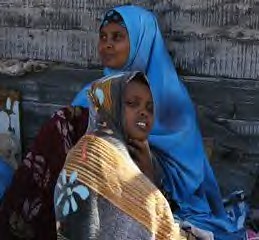
Somali civilians have suffered much as a result of the US political and military interference in their country., a photo by Pan-African News Wire File Photos on Flickr.
FAO, Somalia's President commit to ending food crisis
Mogadishu, Somalia October 16 2012
mareeg.com
Somalia’s newly elected President Hassan Sheikh Mohamud has said his government will work with the UN Food and Agriculture Organization (FAO) to prioritize reviving Somalia’s agricultural glory waned by 20 years of war.
Participating in events to mark this year’s World Food Day celebrations in the Somali capital Mogadishu, Sheikh Mohamud, who became Somalia's first democratically elected president in 20 years, said agriculture forms a key tenet of his development strategy.
“Somalia’s agricultural performance is a crucial part of my government’s recovery plan, which seeks to help hardworking Somali communities to be able to increase local food production to end poverty for ever,”President Sheikh Mohamud adding: “Somali people are able to produce their own food and we have to make sure that that happens soonest," said President Sheikh Mohamud while meeting Luca Alinovi, FAO’s representative to Somalia on Tuesday.
In 2011, a famine affected over 4 million people, or more than half of the population of Somalia, leading to tens of thousands of deaths. The cumulative impact of two decades of conflict also worsened a situation of protracted and complex emergency, which has led to increased vulnerability to food insecurity. In the midst of one of the world’s worst humanitarian crises, hunger and malnutrition are some of the major causes of suffering for significant sections of the population. Latest estimates show 2.12 million people face acute food security crisis especially in the south.
Road map toagricultural recovery
Once one of Africa’s leading exporters of banana and livestock, the Horn of Africa nation has been torn by years civil strife, forcing some of most agriculturally productive communities into displacement and exile. Today, banana exports have fizzled out, while livestock exports resumed in 2009 following a 9-year bad by Saudi Arabia, a key importer of Somali animals.
“These are very important inroads towards making Somalismore resilient and that is where FAO and its partners are concentrating their efforts by boosting farmers’ and herders’ ability to cope with recurrent droughts,” said Alinovi.
The aid delivered by FAO to more than a million people was largely in the form of cash-based interventions that helped vulnerable communities to immediately buy food which, together with agriculture inputs and livestock health and production services, allowed people to remain in theirplaces of origin. Fertilizers and improved seeds were distributed while 22 million livestock were vaccinated or treated. The agricultural assistance enabled farmers in the regions of Bay and Shabelle to double production of maize and sorghum last year, while livestock interventions have been seen to break a vicious cycle of epidemic outbreaks.
A year after 2011's famine, Somalia is now on the path to recovery thanks to the timely interventions targeting herders and farmers in regions plagued by recurrent droughts. FAO, the World Food Programme (WFP) and the UNICEF have developed joint strategy aimed at enhancing synergies to increase resilience to droughts and other crises.
Targeting Agricultural Cooperatives
Agricultural cooperatives are the focus of World Food Day 2012 with a theme “Agricultural cooperatives – key to feeding the world.” In the Somali capital Mogadishu, FAO brought together several cooperatives from the agriculture, livestock and fisheries sectors to strengthen ways of working together.
“Agricultural cooperatives, once better organized and strengthened, have shown to increase performance of smallholder famers and that is a key objective in Somalia,” said Alinovi.
FAO also launched a fish-eating campaign targeting the majority of the Somali population culturally biased against fish. With 20 years of war and no functional government, Somalia’s farmers and herders bore the worst brunt of conflict and recurrent droughts.
No comments:
Post a Comment